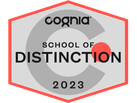IDEAVENTIONS ACADEMY
|
MOEMS, AMCs, and MATHCOUNTS - those are the three math competitions that our lower school students participate in as part of their math class. For most new students to the school, that first math competition is quite more difficult than they anticipated. Even though we let them know not to expect 100% or that it’s different, it’s still a shock when they earn a 2 out of 5 on the MOEMS or an 8 out of 25 on the AMC 8.
We tell our students not to worry about how they do, that a 2 out of 5 is great for a first attempt in a MOEMS competition, and an 8 out of 25 for an AMC is also great! We’re looking for improvement over time, and the problems are difficult and like problems they are not used to solving. The problems between the three competitions are also different and challenge different skills. Speed matters with the AMC and MATHCOUNTS competitions, whereas speed is not a critical component of MOEMS. Some of our students expend significant effort working to move as quickly through the math curriculum as possible. They view it as a ladder to climb to get to a certain level of math by a certain age. When speed through the math curriculum is achieved through significant effort, we prefer that a student meander a bit and explore the world of competition problems. For students for whom there is a gap in the level of math curriculum, and their competition results, we find that high-school math and science classes are difficult. We have seen that when achievement in competition problems is consistent with the achievement in the curriculum, students are better prepared to manage the complexity of their math classes in high school. I recently watched a sweet video about two hypothetical children, one who has had practice learning how to learn, and one who hasn’t had that experience. This video spoke to me on so many levels as I saw the struggles that many of the children that I have worked with have experienced. I love math competition problems because it forces students like Susie to stop and struggle with problem solving. The benefits of learning the skill of how to learn is applicable to more than math. For our students, where math is traditionally a strength, this gives them the perfect opportunity to practice learning, practice being uncomfortable, and practice not intuitively knowing the answer. How to Practice So, can you practice for the competitions? Yes! For MOEMS, there are practice workbooks with problems like the MOEMS competitions. For parents it is something that kids can work on on their own. The answers are in the middle of the book so that the child can check his/her own work. If they get the problem wrong, then they can go back and rework the problem and check their work. If after reworking it, they still don’t understand, they can go to the back of the book and read the solution. After reading the solution, I recommend trying to resolve it again without looking at the solution. Art of Problem Solving also has Beast Academy, which is an online program that also has the option of books. The problems cover more curricular material, and logic. For AMC and MATHCOUNTS, there are past exams that students can take and practice. Goal Setting I think of math competitions the way I think of sports. In this week of the Winter Olympics and the Super Bowl, I see athletes compete at levels that I can’t imagine, and it looks doable when watching it on TV - that is until I strap on the skis and fall all the way down the hill or imagine a 280 lb. man running towards me with the objective of knocking me down, for fun. The athletes we cheer on TV started somewhere, and it was fun. They also worked hard, training, competing, and pushing themselves. For students and math competitions, I would like students to treat the competition like we do sports. I once heard a fencing coach, Bill Grandy, give the best advice as kids were determining whether to compete for the first time, “You have to set goals. If you walk into that first meet and your only goal is to win, then you’re not ready to compete. Set smaller goals that are challenging, but doable.” For a student who has never practiced or taken a math competition test before, walking in and expecting to get a perfect score is the equivalent of winning the fencing meet. I would love to see students participate in the first competition and use that as a baseline, then determine their goal for the following year. Goals could be, improve my score by 3 points or have enough time to try all of the questions. The goals should be based on how much time they plan on practicing. This practice will not only also translate into a different type of understanding of the curricular material, but will also help students with reading comprehension, speed, and creatively thinking about math problems. Additional Resources Do you want to read more? Here are some additional resources that I have found helpful:
0 Comments
Your comment will be posted after it is approved.
Leave a Reply. |
AuthorJuliana Heitz is co-founder of Ideaventions Academy and is very excited to share the thinking behind the Academy. Archives
October 2023
Categories |
Copyright © 2010-2024| 12340 Pinecrest Road, Reston, Virginia 20191 | 703-860-0211 | [email protected] | Tax ID 27-2420631 | CEEB Code 470033
 RSS Feed
RSS Feed




